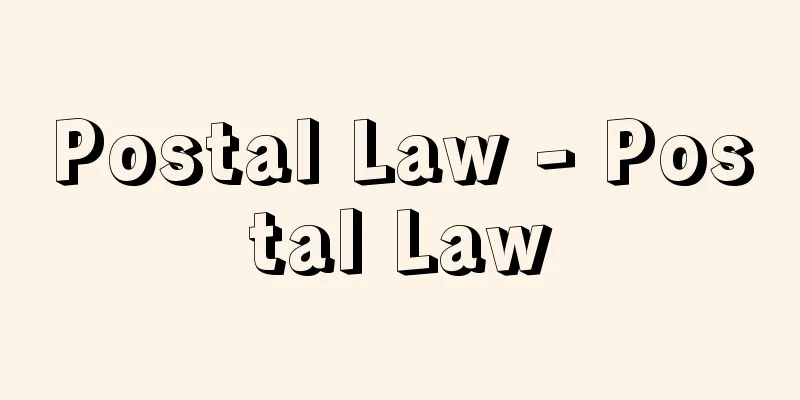Postal Law - Postal Law

|
This law stipulates the basic matters of the domestic postal system. Law No. 165 of 1947. It was promulgated on December 12, 1947, and came into effect on January 1, 1948. Although it has been amended several times since then, it is the basic law for handling postal services under the Constitution of Japan. In March 1871 (Meiji 4), the "Guidelines for those sending letters" was issued, which became the first postal-related legislation. In April of the same year, the postal system was launched, and in December of the same year, when the postal line was extended from Tokyo to Nagasaki, the first "Postal Regulations" were enacted. Since then, they have been revised and supplemented every year in line with the development of the postal system. In April 1873, postal rates were changed from the previous distance-based system to a nationwide flat rate system, and in May of the same year, it was decided that the postal business was a national monopoly. In response to this, the "Postal Crime Penalties" were also enacted. In December 1882, the postal regulations and penalties were integrated to form the "Postal Ordinance." In June 1892, the "Parcel Post Law" was promulgated, and handling of parcel post began in October of the same year. In March 1900 (Meiji 33), the Postal Ordinance, Parcel Post Law and other regulations were abolished, various systems were consolidated, and the old Postal Law and Postal Regulations were enacted, stipulating basic matters in the law and other terms of use and procedures in ministerial ordinances. This legally systematized the modern postal system and improved and enhanced the system. Specifically, special handling systems such as postal mail with listed price and cash collection mail were established, liability for registered mail was specified, and privately made postcards were permitted. The Postal Law, enacted after the Second World War, states in its Chapter 1 General Provisions that "The purpose of this Law is to promote the public welfare by providing postal services universally and fairly at the lowest possible rates," and also stipulates matters such as nationalization of the postal service, monopoly of the business, fairness in use, prohibition of censorship, and ensuring confidentiality of correspondence. The following Chapters 2 and onward stipulate basic matters regarding postal operations, such as prohibited items, types of mail, payment of postal charges, handling of mail, special handling of mail, compensation for damages, and penalties. When the Postal Law was first enacted, postal rates were also stipulated by law, but in the 1971 amendment, postal rates except for those for first class (general letters) and second class (postcards) were delegated to the Ministry of Posts and Telecommunications Ordinance (later to the Ministry of Internal Affairs and Communications Ordinance), and in 1981, the rates for first and second class were also delegated to the ministerial ordinance. On April 1, 2003, Japan Post was established, taking over the postal business of the Postal Services Agency of the Ministry of Internal Affairs and Communications. In conjunction with this, the Postal Law was amended as follows. The "national operation of postal services" in Article 2 was changed to "implementation of postal services," and the article also changed from "postal services are a national business managed by the Minister of Internal Affairs and Communications" to "postal services are conducted by Japan Post (hereinafter referred to as the "Public Corporation") in accordance with the provisions of this Law." Regarding postal rates, Chapter 3 Miscellaneous Provisions states, "The Public Corporation shall determine the following postal rates and obtain approval from the Minister of Internal Affairs and Communications. The same shall apply when it wishes to change these rates." The following rates are rates for regular mail, rates for special handling of regular mail (registered mail, express mail, etc.), and rates for international mail. It was also stipulated that other postal rates must be notified to the Minister of Internal Affairs and Communications. In other words, postal rates could now be revised either with the approval of the Minister for Internal Affairs and Communications or by notifying the Minister for Internal Affairs and Communications. At the same time as the launch of the public corporation, the Law Concerning Delivery of Letters by Private Business Operators (Law No. 99 of 2002) came into force. With the establishment of the new Letter Delivery System, the Postal Law was also amended, and a definition of "letter" was added to the general provisions of the Law Concerning Delivery of Letters by Private Business Operators. The Postal Privatization Law (Law No. 97 of 2005) enacted in October 2005 privatized Japan Post and separated it into separate companies, and it was dissolved when privatization took effect on October 1, 2007. The postal business was transferred to the Japan Post Group (Japan Post Holdings Co., Ltd. and its four subsidiaries Japan Post Network Co., Ltd., Japan Post Service Co., Ltd., Japan Post Bank Co., Ltd., and Japan Post Insurance Co., Ltd.), and the Postal Law was amended accordingly. Article 2 on the implementation of postal services was changed from "Japan Post Public Corporation" to "Japan Post Service Co., Ltd." Article 67, paragraph 1 states that postal fees "must be notified in advance to the Minister of Internal Affairs and Communications," and the fees for first and second class mail were changed from an approval system to a prior notification system. Parcels such as Yu-Pack (general parcels), EXPACK 500 (standard parcels, handling ended in March 2014), Pospacket (simple parcels, handling ended in October 2016), and Yu-Mail (booklet parcels) are no longer subject to the Postal Law and are no longer considered postal items (parcels are subject to regulations such as the Trucking Business Act, and fees changed from a prior notification system to a post notification system). Furthermore, while registered mail, receipt time certification, delivery certification, certified mail, and special delivery are mandatory, express mail, cash on delivery, and New Year's special mail are optional for Japan Post Co., Ltd. (Article 44, Paragraph 1). From the perspective of maintaining credibility, certified mail and special delivery are to be handled by postal certification officers (a newly established national qualification. The person who certifies the handling of certified mail and special delivery is appointed by the Minister for Internal Affairs and Communications based on the recommendation of Japan Post Co., Ltd. from among those who have the necessary knowledge and ability for certification work) (Article 48, Paragraph 2, Article 49, Paragraph 2, Article 59). Furthermore, in April 2012, about four and a half years after the privatization of postal services in October 2007, a law amending the Postal Privatization Act was passed and promulgated in May of the same year. With the enforcement of this law, Japan Post Service Co., Ltd. and Japan Post Network Co., Ltd. were merged to form Japan Post Co., Ltd. in October 2012, and the Japan Post Group was restructured into a four-company system. In addition, the scope of universal services was expanded, and a system was established in which not only the previous postal services but also basic savings and insurance services can be used in an integrated manner at post offices. In recent years, the rapid digitalization of individuals and businesses has led to a general decline in the number of letters, postcards, and other items, while the number of packages handled, such as parcels, has increased sharply. In order to maintain the stable provision of postal services in the future and respond to the rapidly increasing need for package delivery, it has become apparent that there is a need to review the frequency and number of days for delivery of regular mail (relaxation of the approval standards of the Postal Service Management Regulations). In response to this situation, the Act to Partially Amend the Postal Act and the Act on Delivery of Letters by Private Business Operators (Act No. 70 of 2020) was enacted and promulgated in 2020 (Reiwa 2), and came into effect in May 2021. The main changes to the Postal Law are as follows: (1) the range of postal items for which different rates can be set depending on the delivery location will be expanded; and for regular postal items (letters, postcards, etc.), (2) delivery days or more per week will be relaxed from six days or more per week to five days or more per week, and (3) delivery within three days will be relaxed to four days or less in principle. In order to ensure a level playing field between Japan Post Co., Ltd. and general mail delivery businesses, the Law Concerning Delivery of Letters by Private Businesses was also amended with the same contents as those mentioned above in (1) to (3). In addition, with the enforcement of the Act, the Postal Law Enforcement Regulations (Ministry of Internal Affairs and Communications Ordinance No. 5 of 2003) were also amended. The gist of the amendments is that in the clause that stipulates the approval criteria for the Postal Business Management Regulations, (1) the days on which mail is delivered at least once a day will be changed from "six days from Monday to Saturday" to "five days from Monday to Friday", (2) Saturdays on which mail is not delivered will not be counted in the number of days for delivery of mail, and (3) the upper limit of delivery days will be revised in exceptional cases where delivery days exceed four days due to geographical conditions, etc. (remote islands with no means of transportation available to deliver mail at least once a day: 14 days → 15 days, other remote islands: 5 days → 6 days). In response to the above amendments to the Postal Law and the Postal Law Enforcement Regulations, the actual review of postal services (suspension of Saturday delivery, postponement of delivery days, etc.) is scheduled to take place after October 2021. [Haruo Ishii June 21, 2021] [Reference item] | | | |Source: Shogakukan Encyclopedia Nipponica About Encyclopedia Nipponica Information | Legend |
|
内国郵便制度の基本的な事項を規定した法律。昭和22年法律第165号。1947年(昭和22)12月12日に公布され、翌1948年1月1日から施行された。その後幾度か改正が行われているが、日本国憲法のもとにおける郵便取扱いの基本法である。 1871年(明治4年)3月に「書状ヲ出ス人ノ心得」が出され、これが最初の郵便関係の法令となった。同年4月、郵便制度が開始され、郵便線路が東京から長崎にまで延びた同年12月には、最初の「郵便規則」が制定された。以後、郵便制度の発展に合わせて、毎年改正・増補されてきた。1873年4月、郵便料金が従来の距離制から全国均一料金制に改められ、同年5月には郵便事業が国の独占事業であることが定められた。これを受けて「郵便犯罪罰則」も制定された。1882年12月に郵便規則と罰則を統合し、「郵便条例」が制定された。1892年6月には「小包郵便法」が公布され、同年10月から小包郵便の取扱いが開始された。1900年(明治33年)3月には、「郵便条例」、「小包郵便法」およびその他の規則を廃止し、各種の制度を整理統合して、法律には基本的事項、省令にその他の利用条件および手続を規定することとして、旧「郵便法」および「郵便規則」が制定された。これにより近代郵便制度が法的に体系化されるとともに、制度の整備・充実が図られた。すなわち、特殊取扱制度として価格表記郵便、現金取立郵便が開設されたこと、書留郵便の賠償責任が明記されたこと、私製葉書を認めることなどがそれである。 第二次世界大戦後に制定された郵便法は、第1章総則において「この法律は、郵便の役務をなるべく安い料金で、あまねく、公平に提供することによって、公共の福祉を増進することを目的とする」とし、郵便の国営、事業の独占、利用の公平、検閲の禁止、信書の秘密の確保などについても規定している。続く第2章以下においては、郵便禁制品、郵便物の種類、郵便料金の納付、郵便物の取扱い、郵便物の特殊取扱い、損害賠償、罰則等、郵便業務の基本事項を定めている。郵便法制定の当初は、郵便料金についても法律で定められていたが、1971年(昭和46)の改正で、第1種(一般の手紙)と第2種(葉書)を除く郵便料金は郵政省令(その後、総務省令)に委任され、さらに1981年度には、第1種、第2種の料金も省令に委任された。2003年(平成15)4月1日、総務省郵政事業庁の郵政事業を引き継ぎ、日本郵政公社が発足した。これに伴い、郵便法も次のように改正された。第2条に定められていた「郵便の国営」は「郵便の実施」に改められ、条文も「郵便は、国の行う事業であって、総務大臣が、これを管理する」が、「郵便の業務は、この法律の定めるところにより、日本郵政公社(以下「公社」という)が行う」となった。郵便料金については、第3章雑則において、「公社は、郵便に関する料金のうち次に掲げるものを定め、総務大臣の認可を受けなければならない。これを変更しようとするときも、同様とする」とある。次に掲げるものとは、通常郵便物の料金、通常郵便物の特殊取扱い(書留、速達など)の料金、国際郵便に関する料金、である。そして、そのほかの郵便の料金は、総務大臣に届け出なければならない、とされた。つまり、郵便料金は、「総務大臣の認可を受ける」か、または「総務大臣への届出」で改定することが可能となったのである。なお、公社発足と同時に「民間事業者による信書の送達に関する法律」(平成14年法律第99号)が施行された。あらたに「信書便制度」が創設されたことに伴い、郵便法も改正され、また上記の「民間事業者による信書の送達に関する法律」の総則において「信書」の定義規定が設けられた。2005年10月に成立した郵政民営化法(平成17年法律第97号)により、日本郵政公社は民営・分社化されることになり、2007年10月1日の民営化実施に伴い解散した。 郵政事業は、日本郵政グループ(日本郵政株式会社および四つの子会社の郵便局株式会社、郵便事業株式会社、株式会社ゆうちょ銀行、株式会社かんぽ生命保険)に移管され、これに伴い郵便法も次のように改正された。第2条の郵便の実施については「日本郵政公社」から「郵便事業株式会社」に改められた。郵便に関する料金は第67条第1項で「あらかじめ、総務大臣に届け出なければならない」とされ、第1種・第2種郵便物の料金が認可制から事前届出制へ変更された。ゆうパック(一般小包)、EXPACK(エクスパック)500(定型小包、2014年3月で取扱い終了)、ポスパケット(簡易小包、2016年10月で取扱い終了)、ゆうメール(冊子小包)などの小包は、郵便法の適用除外となり、郵便物ではなくなった(小包は貨物自動車運送事業法等の規制の対象となり、料金は事前届出制から事後届出制へ変更)。また、書留、引受時刻証明、配達証明、内容証明、特別送達の提供については義務づけられているが、速達、代金引換、年賀特別郵便の提供は郵便事業株式会社の任意となった(第44条第1項)。内容証明、特別送達の取扱いについては、信頼性を維持するという観点から、郵便認証司(新設された国家資格。内容証明および特別送達の取扱いに係る認証を行う者であり、認証事務に関し必要な知識および能力を有する者のうちから、郵便事業株式会社の推薦に基づいて総務大臣が任命)が行うことになった(第48条第2項、第49条第2項、第59条)。 さらに、2007年10月の郵政民営化実施から約4年半が経過した2012年4月、郵政民営化法等の一部を改正する等の法律が成立し、同年5月に公布された。同法の施行により、2012年10月から郵便事業株式会社と郵便局株式会社が統合され日本郵便株式会社となり、日本郵政グループは4社体制へと再編された。また、ユニバーサルサービスの範囲が拡充され、それまでの郵便のサービスのみならず、貯金および保険の基本的なサービスを郵便局で一体的に利用できる仕組みが確保されるようになった。 近年、個人やビジネスにおけるデジタル化の急速な進展により、手紙や葉書等の物数が総じて減少する一方で、小包等の荷物の取扱い個数が急増しており、郵便サービスの将来にわたる安定的な提供の維持や急増する荷物の配達ニーズへの対応等を図るために、通常郵便物の配達頻度や送達日数に係る見直し(郵便業務管理規程の認可基準の緩和)等を行う必要が顕在化してきた。こうした状況を受けて、「郵便法及び民間事業者による信書の送達に関する法律の一部を改正する法律」(令和2年法律第70号)が2020年(令和2)に成立、公布され、翌2021年5月に施行された。おもな改正内容は、郵便法について、(1)配達地により異なる額の料金を定めることができる郵便物の範囲が拡大されるほか、通常郵便物(手紙、葉書等)について、(2)週6日以上の配達が週5日以上の配達に緩和されるとともに、(3)原則3日以内の送達が原則4日以内の送達に緩和されることとなり、日本郵便株式会社と一般信書便事業者との間の対等な競争条件を確保するため、「民間事業者による信書の送達に関する法律」も上記(1)から(3)までと同内容の改正が行われた。 また、同法の施行に伴い、郵便法施行規則(平成15年総務省令第5号)の改正も行われた。その概要は、郵便業務管理規程の認可基準を定める条項において、(1)1日1回以上郵便物の配達を行う日を、「月曜から土曜までの6日間」から「月曜から金曜までの5日間」とすること、(2)郵便物の送達日数に、配達を行わないこととなる土曜日を算入しないこととすること、(3)地理的条件等により例外的に送達日数が4日を超えることが許容される場合の上限送達日数を改正すること(1日1回以上郵便物の送達に利用できる交通手段がない離島:14日→15日、それ以外の離島:5日→6日)である。上記の郵便法および郵便法施行規則の改正を受け、実際に郵便サービスの見直し(土曜日配達の休止、送達日数の繰り下げ等)が行われるのは、2021年10月以降の予定である。 [石井晴夫 2021年6月21日] [参照項目] | | | |出典 小学館 日本大百科全書(ニッポニカ)日本大百科全書(ニッポニカ)について 情報 | 凡例 |
<<: Postal Newspaper - Postal Newspaper
>>: Postal transfer - Postal review
Recommend
Wehner, H.
...After Orenhauer's death in 1963, West Berl...
Sugaya Bunsou - Kanke Bunsou
A collection of Chinese poetry and prose by Sugaw...
Ukezaki Clivia - Ukezaki Clivia
...A perennial plant of the Amaryllidaceae family...
Allenic bond - Allenic bond
A bond in which three carbon atoms are connected ...
Pearl - Shinju (English spelling) pearl English
It is an abnormal secretion composed mainly of ca...
Steam coal
…Nowadays, most of the consumption for boilers is...
Color wax - Shikirou (English spelling)
Carotenoids, the pigments that give plants their y...
Agricultural Promotion and Merger Law - Kanno Gappeiho
…The Industrial Bank of Japan was the one that re...
Tucher
…However, because linen and woolen production was...
Strelitzia - Strelitzia
It is an evergreen perennial plant of the Musacea...
Phase contrast microscope
Even if there are minute differences in the refra...
Shigemune Itakura
Year of death: December 1, 2002 (January 15, 1657)...
Red-spotted rhododendron - Red-spotted rhododendron
...The subspecies of the forest rhododendron that...
Songtham
…At that time, more than 1,000 Japanese people li...
Bonjol
...The Dutch, who had been based in Padang since ...









